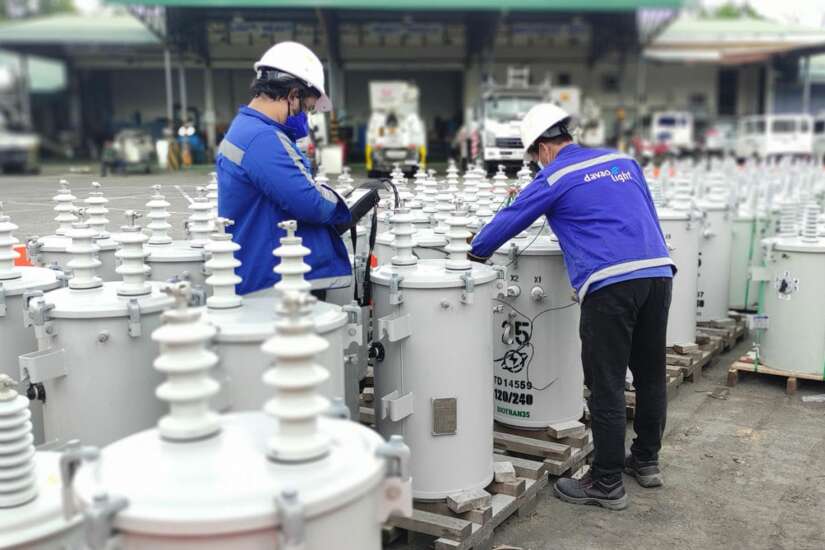AboitizPower subsidiary Davao Light & Power Co. (Davao Light) is embracing more “green” initiatives as it strives to deliver reliable electricity to homes and businesses while helping care for the environment.
Davao Light has already implemented such projects in recent years, including the conversion of Davao City’s High-Pressure Sodium (HPS) street lamps to Light Emitting Diode (LED) lights, which have 70% lower energy consumption, maintenance costs, and lasts three to four times longer than the former, helping improve overall energy efficiency as well as reducing environmental impact.
Davao Light also unveiled its fully digital substation just late last year. Among other advantages such as enhanced efficiency, reliability, and availability of power supply through real-time control and protection operations, digital substations have fewer conventional components that enable space reduction in the total area required for the installation of equipment, allowing for a decrease in substation footprint.
But little do people know that the distribution utility has been at it for much longer.
Since 2015, the power distributor has been using natural ester oil as insulation fluid for all of its new distribution transformers. Davao Light sets aside ₱87 million to purchase around 1,300 “green” transformers each year, mainly meant to serve the ever-growing demand of distribution transformer installations and to replace old units that use mineral oil due for decommissioning.
Natural ester, which is classified as vegetable oil, is sourced from rapeseed, canola, or soybean, making it non-toxic and 100-percent biodegradable.
Mineral oil, meanwhile, is derived from crude petroleum. While generally effective for transformers, one of its disadvantages is that mineral oil leaks are more susceptible to fire due to their relatively low flashpoint. Used transformer oil, some types of which are considered toxic, must be dealt with through accredited environmental services companies for recycling or disposal.
“We had difficulties in looking for contractors that can safely dispose of our used transformer oil, which back then was still mineral. Since it was already widely used in the energy industry, natural ester was an attractive option to us,” shared Arnel Bersabe, head of Davao Light’s substation and electrical equipment department.
Distribution transformers perform the last voltage transformation in the grid, transforming medium voltages such as 13,800 volts, 23,000 volts, and 34,500 to one suitable for household and commercial use, typically around 240 volts.
Bersabe said they considered how natural ester helps prolong the life of transformers and is safer to use than mineral oil because it needs a higher temperature to burn. The average lifespan of distribution transformers is 35 years, but ester oils are estimated to extend the longevity of units by up to 33 percent.
While he admitted that esters are 20 to 25 percent relatively more expensive than their mineral counterpart, the advantages offered by these fluids lead to cost savings on the part of the utility, which may eventually be translated into greater customer benefits.
Pushing the sustainability envelope further, Bersabe shared that Davao Light is also looking into using amorphous steel instead of the current silicon steel for the core components of their transformers.
The Davao Light officer said that according to studies, amorphous steel can lower transformer losses, or the energy “wasted” due to resistance in the wire used to wind a coil, by up to 60 percent for a typical 50 kVA unit. He added that the total owning cost for transformers that use amorphous steel cores is pegged to be at least 10 percent lower than those that use conventional silicon steel.
“We are still validating this data. We will have a simulated installation of this transformer for actual measurement of its losses and verification of its in-service performance,” Bersabe said. Distribution transformers consist of a magnetic core made from laminated silicon steel sheets stacked and either glued together with resin or banded together with steel straps, with primary and secondary wire windings wrapped around them.
Through innovations such as these, Davao Light sets an example for other distribution utilities in the pursuit of sustainability.
Davao Light is the third-largest privately-owned electric distribution utility in the country in terms of customer size and annual kWh sales. Davao Light’s franchise area covers Davao City, areas of Panabo City, and the municipalities of Carmen, Dujali, and Santo Tomas in Davao del Norte, with a population of approximately 2.2 million and a total area of 3,561 square kilometers.
As of December 2021, Davao Light served a total of 458,498 customers, with a recorded peak demand of 459 MW.
About AboitizPower
AboitizPower is the holding company for the Aboitiz Group’s investments in power generation, distribution, and retail electricity services. It advances business and communities by providing reliable and ample power supply at a reasonable and competitive price, and with the least adverse effects on the environment and host communities.
The company is one of the largest power producers in the Philippines with a balanced portfolio of assets located across the country. It is a major producer of Cleanergy, the company’s brand for clean and renewable energy with several hydroelectric, geothermal, and solar power generation facilities. AboitizPower, together with its partners, is the Philippines’ largest owner and operator of renewable energy based on installed capacity. It also has thermal power plants in its generation portfolio to support the country’s baseload and peak energy demands.
The company also owns distribution utilities that operate in high-growth areas in Luzon, Visayas, and Mindanao, including the country’s second and third largest private utilities.
In the next 10 years, the company will significantly expand its Cleanergy portfolio, in support of the government’s efforts to promote renewable energy in the country. AboitizPower will build an additional 3,700 MW of renewable energy, growing its existing Cleanergy capacity threefold by 2030.

